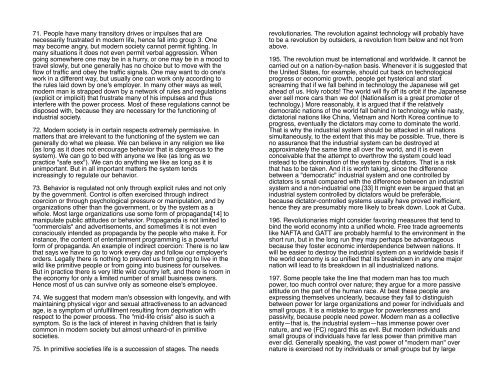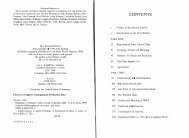Unabomber Manifesto - ouroboros ponderosa
Unabomber Manifesto - ouroboros ponderosa
Unabomber Manifesto - ouroboros ponderosa
You also want an ePaper? Increase the reach of your titles
YUMPU automatically turns print PDFs into web optimized ePapers that Google loves.
71. People have many transitory drives or impulses that arenecessarily frustrated in modern life, hence fall into group 3. Onemay become angry, but modern society cannot permit fighting. Inmany situations it does not even permit verbal aggression. Whengoing somewhere one may be in a hurry, or one may be in a mood totravel slowly, but one generally has no choice but to move with theflow of traffic and obey the traffic signals. One may want to do one'swork in a different way, but usually one can work only according tothe rules laid down by one's employer. In many other ways as well,modern man is strapped down by a network of rules and regulations(explicit or implicit) that frustrate many of his impulses and thusinterfere with the power process. Most of these regulations cannot bedisposed with, because they are necessary for the functioning ofindustrial society.72. Modern society is in certain respects extremely permissive. Inmatters that are irrelevant to the functioning of the system we cangenerally do what we please. We can believe in any religion we like(as long as it does not encourage behavior that is dangerous to thesystem). We can go to bed with anyone we like (as long as wepractice "safe sex"). We can do anything we like as long as it isunimportant. But in all important matters the system tendsincreasingly to regulate our behavior.73. Behavior is regulated not only through explicit rules and not onlyby the government. Control is often exercised through indirectcoercion or through psychological pressure or manipulation, and byorganizations other than the government, or by the system as awhole. Most large organizations use some form of propaganda[14] tomanipulate public attitudes or behavior. Propaganda is not limited to"commercials" and advertisements, and sometimes it is not evenconsciously intended as propaganda by the people who make it. Forinstance, the content of entertainment programming is a powerfulform of propaganda. An example of indirect coercion: There is no lawthat says we have to go to work every day and follow our employer'sorders. Legally there is nothing to prevent us from going to live in thewild like primitive people or from going into business for ourselves.But in practice there is very little wild country left, and there is room inthe economy for only a limited number of small business owners.Hence most of us can survive only as someone else's employee.74. We suggest that modern man's obsession with longevity, and withmaintaining physical vigor and sexual attractiveness to an advancedage, is a symptom of unfulfillment resulting from deprivation withrespect to the power process. The "mid-life crisis" also is such asymptom. So is the lack of interest in having children that is fairlycommon in modern society but almost unheard-of in primitivesocieties.75. In primitive societies life is a succession of stages. The needsrevolutionaries. The revolution against technology will probably haveto be a revolution by outsiders, a revolution from below and not fromabove.195. The revolution must be international and worldwide. It cannot becarried out on a nation-by-nation basis. Whenever it is suggested thatthe United States, for example, should cut back on technologicalprogress or economic growth, people get hysterical and startscreaming that if we fall behind in technology the Japanese will getahead of us. Holy robots! The world will fly off its orbit if the Japaneseever sell more cars than we do! (Nationalism is a great promoter oftechnology.) More reasonably, it is argued that if the relativelydemocratic nations of the world fall behind in technology while nasty,dictatorial nations like China, Vietnam and North Korea continue toprogress, eventually the dictators may come to dominate the world.That is why the industrial system should be attacked in all nationssimultaneously, to the extent that this may be possible. True, there isno assurance that the industrial system can be destroyed atapproximately the same time all over the world, and it is evenconceivable that the attempt to overthrow the system could leadinstead to the domination of the system by dictators. That is a riskthat has to be taken. And it is worth taking, since the differencebetween a "democratic" industrial system and one controlled bydictators is small compared with the difference between an industrialsystem and a non-industrial one.[33] It might even be argued that anindustrial system controlled by dictators would be preferable,because dictator-controlled systems usually have proved inefficient,hence they are presumably more likely to break down. Look at Cuba.196. Revolutionaries might consider favoring measures that tend tobind the world economy into a unified whole. Free trade agreementslike NAFTA and GATT are probably harmful to the environment in theshort run, but in the long run they may perhaps be advantageousbecause they foster economic interdependence between nations. Itwill be easier to destroy the industrial system on a worldwide basis ifthe world economy is so unified that its breakdown in any one majornation will lead to its breakdown in all industrialized nations.197. Some people take the line that modern man has too muchpower, too much control over nature; they argue for a more passiveattitude on the part of the human race. At best these people areexpressing themselves unclearly, because they fail to distinguishbetween power for large organizations and power for individuals andsmall groups. It is a mistake to argue for powerlessness andpassivity, because people need power. Modern man as a collectiveentity—that is, the industrial system—has immense power overnature, and we (FC) regard this as evil. But modern individuals andsmall groups of individuals have far less power than primitive manever did. Generally speaking, the vast power of "modern man" overnature is exercised not by individuals or small groups but by large






